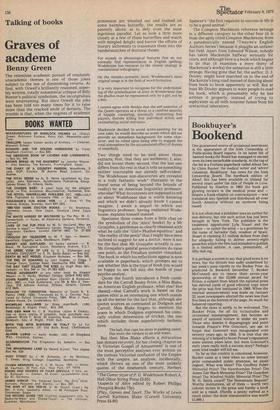Talking of books
Graves of academe
Benny Green
The relentless academic pursuit of resolutely unacademic themes is one of those jokes subject to the law of diminishing returns. At first, with Orwell's brilliantly reasoned, superbly written, totally nonsensical critique of Billy Bunter's political symbolism, the incongruities were entertaining. But since Orwell the joke has been told too many times for it to raise more than the cracked smile of derision. The trouble is that, when the engines of academic pretension are wheeled out and trained on some harmless butterfly, the results are so patently idiotic as to defy even the most ingenious parodist. Let us look a little more closely at a few of those butterflies and watch with mingled delight and horror the efforts of literary alchemists to transmute them into the bandersnatches of doctoral theses:
For sounds or phonological features that do not normally find representation in English spelling, Wodehouse has recourse to the closest analogy in conventional orthography.
On the morpho-syntactic level, Wodehouse's most original usage is in the field of word-formation.
It is very important to recognise for the understanding of the symbolisation of Alice in Wonderland that the phallus must be represented only by a girl, not by a boy.
I cannot agree with Henkle that the self-assertion of the Queen operates as a threat to a carefree anarchy of happily coexisting, minimally interacting free players, thereby killing free individual action and necessitating social restraints.
Mackenzie decided to avoid scene-painting for its own sake; he would describe no scene which did not provide an immediate background for some character, and he relied upon being able to suggest the total atmosphere by the accumulated effect of dozens of snapshots.
Two things need to be said about those extracts; first, that they are authentic: I, alas, did not invent them; second, that the last one differs from the rest in that it tells us something neither inscrutable nor already self-evident. The Wodehouse non-discoveries are revealed in a truly fantastic work* (fantastic in the literal sense of being beyond the bounds of reality) by an American linguistics professor, who else? What its contents are supposed to tell us about Wodehouse that is worth knowing and which we didn't already know 1 cannot imagine. I await a sequel in which our linguistics professor, having explained Wodehouse, explains himself instead.
Specimen three comes from a little chat on the symbolism of the 'Alice' bookst by a Mr Grosjahn, a gentleman so clearly obsessed with what he calls the "Girl = Phallus equation" and "the reality of the penis" that I might have been inclined to suggest he see a doctor, were it not for the fact that Mr Grosjahn actually is one. Mr Grosjahn's genital preoccupations do raise one point, as the Freudian punster remarked. The book in which his reflections appear is now available in paperback, which prompts me to ask whether this is the type of book you would be happy to see fall into the hands of your psycho-analyst. Quote the fourth introduces a fresh candidate for the Carroll Booby Prize, a Miss Blake, an American English professor, what else? Her thesist —that Carroll's work is based on the games ethic is an interesting one which stands up all the better for the fact that, although she quotes sources as contrasted as Dodgson and Carroll, Miss Blake forgets to mention the poem in which Dodgson expressed his comically violent detestation of cricket, the one which includes those superlatively bathetic lines:
The ball, that raps his shins in padding cased, Has worn the verdure to an arid waste.
But then Miss Blake effects a miraculous last-minute rebovery, for her closing chapter on 'A Victorian Gospel of Amusement' is one of the most perceptive analyses ever written on the curious Victorian confusion of the Empire with the umpire, an analysis, incidentally, which throws up one of the most unlikely quotes of the nineteenth century, Herbert
*The Comic Style of P. G. Wodehouse Robert A. Hall (Shoe String Press £3.65) fAspects of Alice edited by Robert Phillips (Penguin_Books 75p) tPlay, Games and Sport. The Works of Lewis Carroll Kathleen Blake (Cornell University Press £4.80)
Spencer's "the first requisite to success in life is to be a good animal."
The Compton Mackenzie reference belongs in a different category to the other four (it is from the aptly titled Compton Mackenzie, from a paradoxically named 'Tway ne's English Authors Series') because it ploughs an unfamiliar field. Apart from Edmund Wilson, nobody has taken Mackenzie halfway seriously for years, and although here is a book which begins to do that (it examines a mere thirty of Mackenzie's works) the sensation is still a little strange. Having gone that far, the author, D. J. Dooley, might have marched on to the end of Mackenzie's long road instead of dancing about from book to book apparently at will. But at !east Mr Dooley appears to want people to read his book, which is presumably why he has written it properly, instead of trying to asphyxiate us all with noisome fumes from his syntactical laboratory.


































 Previous page
Previous page